Hebrew
Sh’lah L’kha: Send Yourself
Wednesday, May 29, 2013 by Torah Talk with Michael Carasik | Jewish Ideas Daily » Weekly Portions
"Send men to scout the land"—and the mysterious word that's missing from that translation. (Click here for source sheet.) Download Naso: When Wives Go Astray
Tuesday, May 14, 2013 by Torah Talk with Michael Carasik | Jewish Ideas Daily » Weekly Portions
The straying wife of Num. 5:13—was she "seized" or was she "caught in the act"? (Click here for source sheet.) Download Toldot: Scenes from a Marriage
Tuesday, November 13, 2012 by Torah Talk with Michael Carasik | Jewish Ideas Daily » Weekly Portions
This week, Isaac prays "on behalf of" his wife—but that's not what the Hebrew really means. (Click here for source sheet.) Download | Duration: 00:10:45
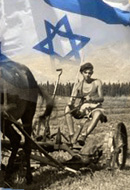 The Road Not Taken
The Road Not TakenFriday, August 24, 2012 by Johanna Kaplan | Jewish Ideas Daily » Daily Features
In my unusually large, far-flung, contentious, loopy contingent of maternal first cousins, the quandary of aliyah, or not, at one time or another, has possessed—pierced—nearly all of us. And this is so despite the great divergence in our ages, interests, temperaments . . .
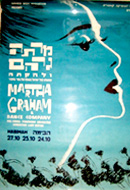 What is Jewish Dance?
What is Jewish Dance?Wednesday, May 9, 2012 by Walter Zev Feldman | Jewish Ideas Daily » Daily Features
For readers interested in the development of folk dance and, to a lesser extent, modern dance in Israel, Seeing Israeli and Jewish Dance, edited by Judith Brin Ingber, a dance scholar who has written widely on Israeli dance, is a valuable resource.
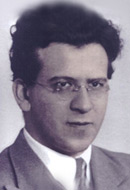 Heschel in Yiddish and Hebrew
Heschel in Yiddish and HebrewWednesday, March 14, 2012 by Yehudah Mirsky | Jewish Ideas Daily » Daily Features
Standing at Sinai, "All the people were seeing the thunder" (Exodus 20:15), seeing the sounds. The word "revelation" would be somewhat misleading, since nothing was unveiled: The mountain was wreathed in cloud and smoke.
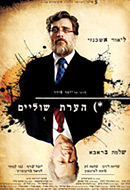 Footnotes to Footnote
Footnotes to FootnoteFriday, March 2, 2012 by Michael Fagenblat | Jewish Ideas Daily » Daily Features
Director Joseph Cedar's film Hearat Shulayim (Footnote) takes place in the Hebrew University Talmud Department, the Israel Academy of Sciences and Humanities, and the (unnamed) Shalom Hartman Institute—the Jerusalem cloisters of the small network of Israel's talmudic academic elite.
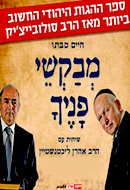 In Search of the Moderate Voice
In Search of the Moderate VoiceTuesday, December 20, 2011 by Lawrence Grossman | Jewish Ideas Daily » Daily Features
Rabbi Haim Sabato is a unique figure on the Israeli scene, both head of a yeshiva and a prominent Hebrew writer. His best known work, the novel titled Adjusting Sights, won Israel's most prestigious literary award and was made into a movie.
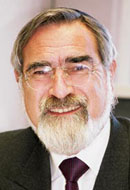 Rosh Hashanah with the Chief Rabbi
Rosh Hashanah with the Chief RabbiTuesday, September 20, 2011 by Lawrence Grossman | Jewish Ideas Daily » Daily Features
Ten years ago, the first day of Rosh Hashanah—the two-day Jewish New Year—fell on September 18. That was one week after September 11, 2001, when almost 3,000 people were killed by Muslim terrorists. On that Rosh Hashanah, rabbis did not lack for sermon topics.
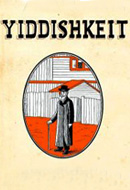 Enmity; or, Yiddish in America
Enmity; or, Yiddish in AmericaMonday, September 12, 2011 by Allan Nadler | Jewish Ideas Daily » Daily Features
He was irascible, neurotic, self-obsessed, and socially inept; a brilliant misfit and misanthropic dilettante. Upon his death in July 2010, Harvey Pekar's few close friends insisted that the underground comic-book writer was also a gem in the rough, an out-of-date socialist naïf.
Editors' Picks
The Cognate Accusative: An Appreciation Philologos, Forward. English and other European languages have an aversion to pairing verbs with etymologically-related objects. But the form is common in Hebrew.
Hebrew Comes to Harlem Julie Wiener, Jewish Week. The New York school board’s approval of a Hebrew charter school in South Harlem heralds a new educational partnership between Harlem’s diverse black community and Upper West Side Jews.
The Maturation of Etgar Keret Bezalel Stern, The Millions. While other Israeli authors write about the country's political or social problems, Etgar Keret focuses on the futility of the human condition. Israel just brings that condition into stark relief.
Who Killed Hebrew in America? Cynthia Ozick, New Republic. Who could have foretold an eruption of Hebrew-generative genius on the American continent—which, having no offspring, then came to nothing?
Odyssey Rafi Weichert, Ilanot Review. An apropos poem for tomorrow's Bloomsday celebrations. (Hebrew and English)
A Stanza of One's Own Renee Levine, Jerusalem Post. In the nineteenth century, visitors began to appear in Trieste, Italy, to ascertain whether or not a woman was in fact producing the Hebrew verses published under the name "Rachel Morpurgo."
American Hebrew Poetry? Jerome Chanes, Forward. One of the best-kept secrets of Jewish American history is the creation of an indigenous Hebrew poetry in the first half of the 20th century.
Search on a Centennial Ben Sales, JTA. One hundred years ago, Yosef Haim Brenner sold a pair of suspenders to fund the publication of S.Y. Agnon's first book—copies of which are now actively sought after.
And It Came to Pass at Midnight Michael Pitkowsky, Menachem Mendel. Audio and video of several renditions of "Karev Yom," a Byzantine-era piyyut sung at the end of the seder.
What Passover Sounded Like 370 Years Ago Fred MacDowell, On the Main Line. Musical notation for two end-of-seder songs in a 17th-century Haggadah is brought to life in a Toronto Jewish high school. (Video)

